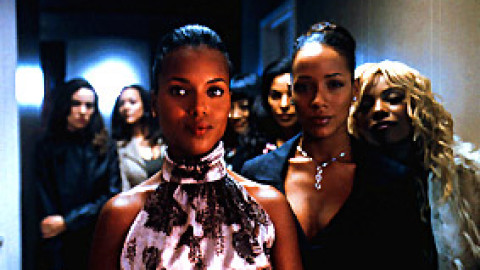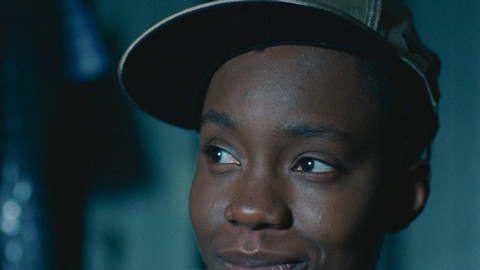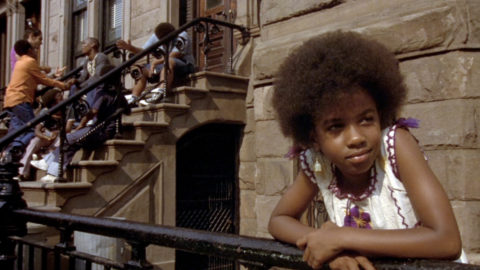Review: Chi-Raq
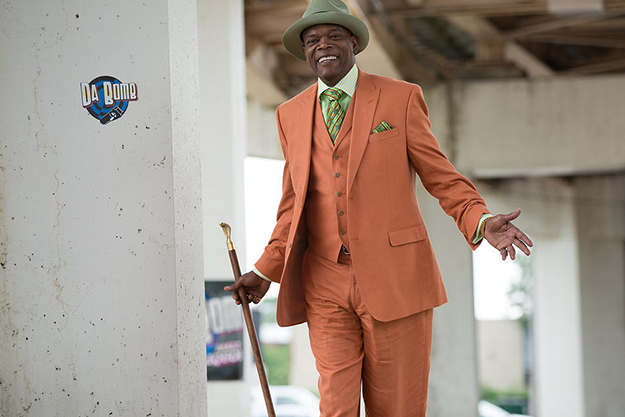
When is a satire not a satire? For many critics responding to Spike Lee’s Chi-Raq, the tendency has been to treat the film as if it was never one to begin with, and to excoriate its unrealistic dialogue, hyper-sexualized depiction of black women, and facile solution to urban gun violence. On one hand, it seems strange to take any part of Chi-Raq literally, given that it announces its source (Lysistrata) and it’s narrated in rhyming verse by Dolemedes (an unrepentantly shouty Samuel L. Jackson), a Greek chorus-cum-grio character who directly addresses the camera. Lee transposes Aristophanes’ comedy about women withholding sex to end the Peloponnesian War, to present-day “Chi-Raq” (the controversial portmanteau conflating Chicago with Iraq): Lysistrata (Teyonah Parris) organizes a city-wide sex strike in a bid to end gang warfare between the Trojans, led by Chi-Raq, aka Demetrius Dupree (Nick Cannon), and the Spartans, led by Cyclops (Wesley Snipes). (The fact that these are the only two gangs in Chicago’s South Side, let alone the city, is another sign that we’re definitely not in the real world.) After occupying the city’s armory with 74 other “black and brown women,” Lysistrata’s strike spreads around the world, and eventually comes to stand in for world peace. It’s both outrageous and full of outrage, offering up cold hard facts about how the government has continued to ignore and disenfranchise urban communities… and lots of cock-teases in daisy dukes.
But then, Lee has always been in the business of sugarcoating some very nasty pills, some more successfully than others. Chi-Raq’s fantastical aesthetic quotations and raucous jokes very often live only for the moment, superseding any aim beyond stylistic excess, such as when a Spartan hops on a pole and starts dancing because all the strippers have gone home. However, there are other moments that are complex in their style and subtext, but still retain a degree of comedy: after three months without sex, the men stage a “slow-jam offensive” against the armory, standing outside in t-shirts and boxers, swaying in unison as The Chi-Lites’ “Oh Girl” blasts over loud speakers, a la “Operation Nifty Package,” the musical offensive that drove Manuel Noriega out of his compound. (This song choice is not only a nod to hometown pride, but was also used in the soundtrack for Crooklyn.) In this scene, Lee fuses everyday sexuality (what clothing men typically sleep in), an army operation against a dictator the U.S. put into power, Seventies soul, and music-video choreography, in an unrepentant spectacle of blue-balled desperation. (Lysistrata defuses the “bombing” by distributing earplugs.)
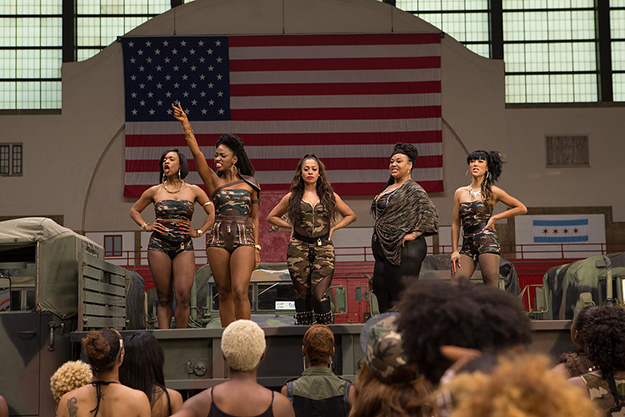
There are many moments when this excess isn’t so benign, which leads me to say something that should never be taken for granted: satire doesn’t exist in a vacuum, and its success lies in its execution. One of the most unrepentantly grotesque scenes is when Lysistrata takes over the armory by seeking out the old, white General King Kong (David Patrick Kelly, who played Luther in The Warriors). Dressed in stiletto boots and barely-there, haute couture army fatigues, she towers over him as he shows her the “whistling dick” Civil War–era cannon inside his office, with non-diegetic squishing sound effects added as he demonstrates loading it with a long pole. Seduced by her sheer presence alone, the General rips off his clothes to reveal Dixie flag underwear. She grimaces and howls with delight as he orders her to “come here, you nappy-headed ho!” This reference to Don Imus in his throes of ecstasy is intended to be a commentary on the two-note depiction of black womanhood, one that is inherently monstrous and inferior but also hypersexual. Yet the scene feels disgusting, and not just because it seems to last forever. It’s a metonym for the play’s conceit (that the key power women hold over men is sexual power), but by adding the element of race, it also restages one of slavery’s great myths: black women are only built for fucking, and it’s okay to take it whenever you want because they always like it. These prejudices (and centuries of sexual violence perpetrated because of them) aren’t a factor in the Greek original, because Greek women were not enslaved for centuries before the play was written. Lee’s perpetually unfortunate decisions about costuming, combined with later scenes that depict black women gyrating and gasping for sex at the drop of hat, don’t bolster the “subversive” nature of Lysistrata’s trick; instead, she becomes just another whore turning a trick. (The white mayor’s biracial, trophy wife—who is only ever shown in passive, ready-to-be-fucked repose—repeats this ugly sexual formula without a fig leaf of criticism.)
Setting aside the sexual politics of the original play for a moment, Lee and co-writer Kevin Willmott give the striking women the slogan “save our babies.” With the exception of three who have jobs (a pediatrician, a lawyer, and a news reporter), all of the black women in the film are depicted first and foremost as mothers. It is the thought of losing a child that motivates them to suppress their own sexual desires, with the absence of black fathers used as a late, treacle-y plot point. Lee depicts black sex aggressively, no more clearly than when Lysistrata and Chi-Raq face off in a “fuck-off” to end the sex strike. While Chi-Raq dresses as he usually does, Lysistrata’s hair is swept up into an afro-futurist Mohawk, paired with a low-cut vest with gold chains attached—basically a “Sexy Mr. T” Halloween costume. (These sorts of bonkers, “I can’t believe that he did that”/“Is that what he’s actually doing? It’s too crazy” visual references run throughout the film, like a moment near the end where Lysistrata and a priest walk away from the signing of the peace treaty through onlookers standing in a manner that’s reminiscent of the Soul Train Line.)
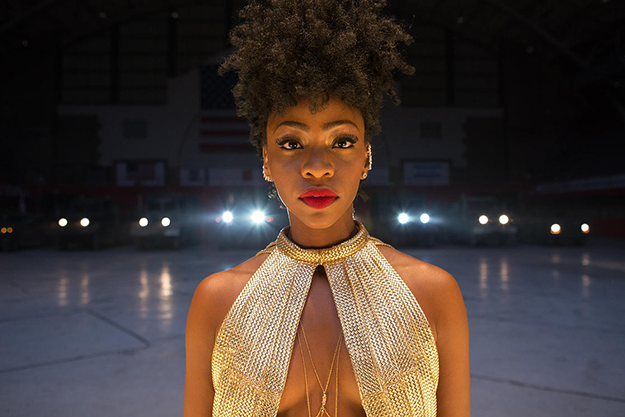
Still, the one obvious place that this totally on-the-nose film Lee chooses not to go is rape. Its absence here parallels films involving an unexpected pregnancy that don’t mention abortion as an option. Leaving rape out of the film’s equation helps Lee prove what may or may not be his fictional point: troublingly, Lee stated in an interview that sex strikes could be used on college campuses to stop rapes there. However, Lee could also be using the controversy generated from such an offensive, besides-the-point remark about one social issue to promote his film about a lower-profile social issue. The final Patton-inspired image Lee leaves us with is Dolemedes in front of the American flag, begging us to fix our cities and stop violence. (He doesn’t say “no peace, no pussy” at this point.) The American flag is then pulled down to reveal the city of Chicago’s flag, and the superimposed text appears: WAKE UP. Cycling between boredom, joy, profound sadness, and annoyed suspicion of what I was seeing, I’m still trying to sort out what exactly this film actually says versus what it is trying to say.



